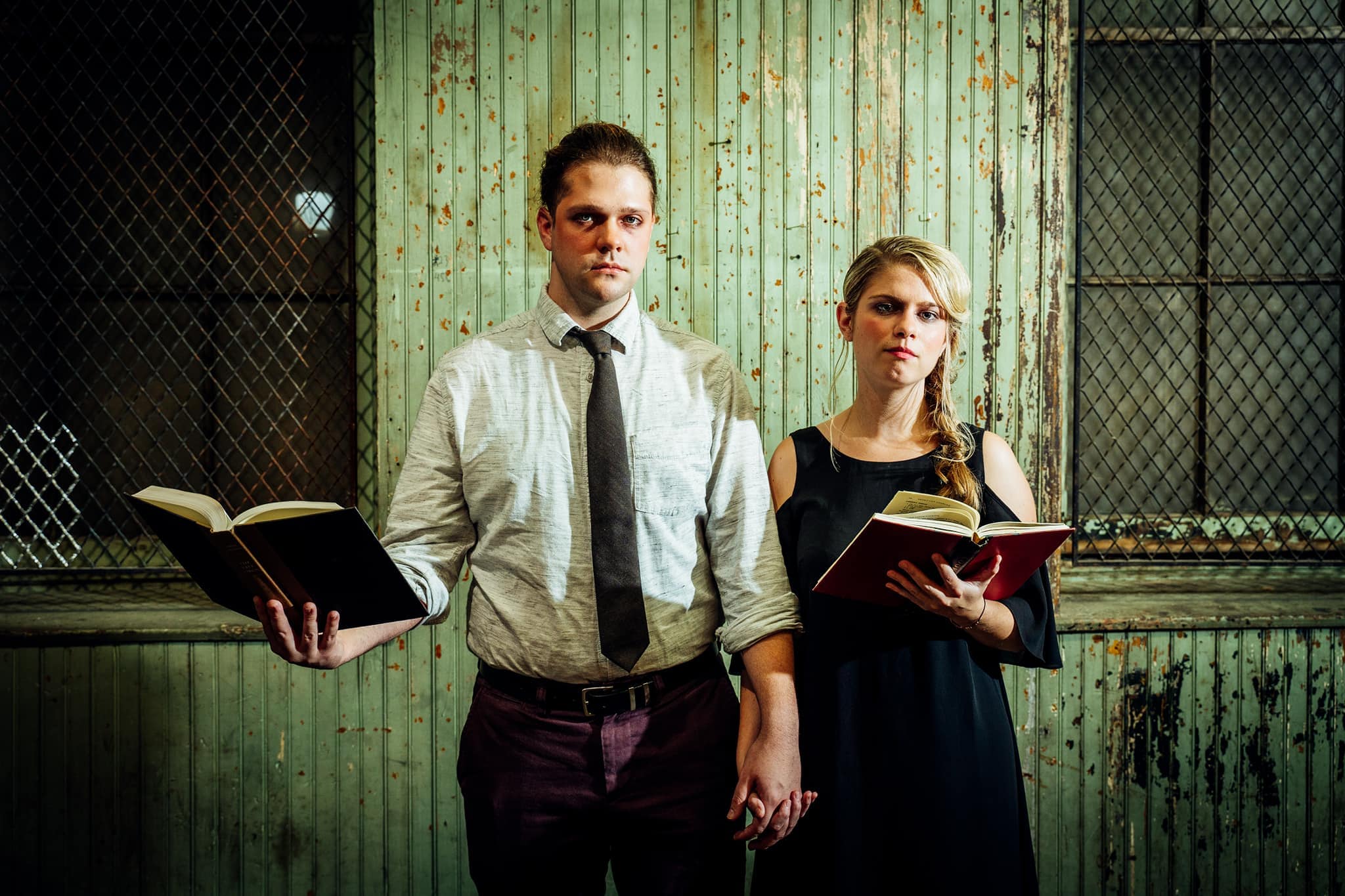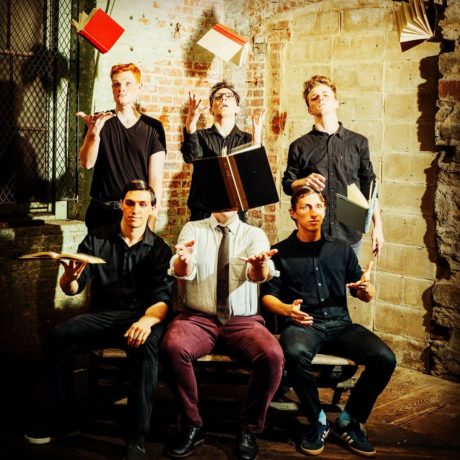Ryan Haase, the wunderkind behind StillPointe Theatre Initiative, ends the pre-show announcement for his current production of the musical Spring Awakening by urging us to “forget the craziness outside” and merely focus on the show. Considering that this show depicts societal disbelief of girls who report sexual assault, an expectant teen’s being compelled to undergo a back-alley abortion, and the denial of a crucial promotion to a qualified person whose only crime was not to be the preference of the party in power, one might suspect that his advice is disingenuous.

Nevertheless, as with so many of his artistic choices, Haase has a point that is more valid than it may at first appear. By seeing this show as a metaphor for our contemporary chaos, it’s all too easy to overlook the more disturbing fact that these issues were just as relevant 127 years ago, when Frank Wedekind wrote the play on which this musical is based, as they are today – and, alas, are likely to remain 127 years from now.
Indeed, the genius of this adaptation by composer Duncan Sheik and lyricist Steven Sater is that it dramatizes the past and present simultaneously, punctuating Wedekind’s original text with grunge-rock explosions that bare the emotions roiling beneath the regimented decorum of refined and often reticent 19th-century language. Haase marvelously mirrors this aesthetic in his visual design, which scatters antique-looking props about a warehouse-like space to create a punk-art landscape.
Disarming nonsense can be subversive in and of itself, but the more one begins to make sense of this set, the more provocative it becomes. Surely the kindergarten-sized chairs the adolescent characters are forced to sit in are meant to show how ridiculous, uncomfortable, and even dangerous it is to try to keep young people from growing up. And the various globes that are prominently placed – yet never used – plainly serve to remind us how few of these people will ever experience the world beyond their small and small-minded town.
But what are we to make of the baby grand piano where Georg (Anthony Case) hysterically receives lessons in both music and sex education from his buxom but oblivious teacher? For all its opulence, the instrument has no strings to make his stabs at self-expression heard – symbolic, perhaps, of how so many tantalizing promises made to the younger generation prove to be empty. And could it be that the stuffed stag’s head and other mounted antlers that surround the audience (even in the restrooms) are intended to suggest that kids are being metaphorically hunted for sport and displayed as trophies by their elders, or at least by the predatory moral code the adults help enforce?
Haase’s collaborators are equally bold in their artistic statements – and just as stunning. Costumer Ben Kress dresses the boys in baby-blue uniforms that initially have grandiosely feminine lace collars, like the Victorian outfits that sought to deny children’s sexuality by blurring the distinction between genders, often with dubious results. The boys do shed these stifling frills once they discover the facts of life, but the girls continue to go about in their stocking feet, as if already condemned to a life of being barefoot and, ultimately, pregnant.
Most brilliant of all is Kateri Pelton’s lighting plot, wherein table lamps are employed like miniature floor ones, positioned as they are on the ground around the perimeter of the playing area, as if they were infantile fixtures being expected to do the work of grown-up ones. Also a bit like the children in this show, these lamps have had their protective shades stripped off, exposing the naked bulbs beneath. The resultant ghostly glare draws our eyes like moths to a flame, especially when augmented by upward-projecting LED lights that bathe the stark walls surrounding the audience with firework-like bursts of color. Moreover, the lamps can be manually rearranged to create “footlight” effects, indicating how enlightenment can come from those we look down upon, if we but open our eyes to them.
In his capacity as director, however, Haase does not entirely absolve the youngsters from responsibility for their problems, much less present them as behavioral models. His most anachronistic touch is to equip all the actors with iPhones, to which they frequently devote their attention at inappropriate times. The implication appears to be that the personal disconnection now often blamed on social media was, in fact, prevalent long before such technology was available, and that absorption in such distractions is and always has been an attempt to hide from the awkwardness of revealing one’s true feelings face to face.
Even more strikingly instructive is the saga of Kristin Rigsby’s rave-like choreography, which caused several injuries in rehearsal, including a broken foot that has made it necessary for one cast member, the radiant Compton Little, to perform in a cast of her own while seated in a period-style wheelchair. “Look what these kids do to themselves if left to their own devices,” the forces of repression might say. “Look what we’re still willing and able to do despite anything that gets in our way,” the kids might reply.

Speaking of triumphing over impediments, Nick Fruit’s accomplished portrayal of the terminal loser Moritz manages to be compelling even when the view of him is obstructed – which in my case was about 70% of the time – by one of the six pillars that ring the playing space. And despite the fact that none of the performers are miked in this acoustically challenging venue, they are always audible above the wondrous but often thunderous five-piece band, thanks no doubt to the coaching of Musical Director Charlotte Evans.
All fifteen actors deserve kudos for both their emotional commitment and their athletic prowess in meeting this show’s formidable demands. Among the ensemble, I must particularly commend Katie Rey Bogdan (Martha) and Amber Wood (Ilse) for the raw intensity they bring to “The Dark I Know Well,” but I was no less moved by Sarah Burton, Max Cortezi, Chelsea Paradiso, and Caitlin Weaver, whose work was similarly heartfelt, even though they weren’t blessed with such an obvious moment in the spotlight.
B. Thomas Rinaldi and Courtney Proctor play all the adult roles, making the most despicable of them sympathetic and the most well-meaning of them deplorable. Seth Julius Fallon (Hanschen) and Josh Schoff (Ernst) enact the awakening of gay desire with an amusing absence of sentimentality, reassuring us that the marginalized can carve out a niche even in a society as intolerant as pre-World War I Germany’s, albeit only by being comparably cynical. Haase underscores this point by including a lesbian couple who fly under the radar in the choral scenes as well.
One could complain that the passion of the central lovers, Wendla (Jennie Phelps) and Melchior (Paul Kennedy), is more convincing when they are apart than when they’re together, ironically lending support to their parents’ notion that they are better kept at a distance. But I suspect the lesson is not so much that absence makes the heart grow fonder, but that uniting after an excessively prolonged separation only imposes undue pressure that can kill the spontaneity of youthful affection. That reservation aside, both Phelps and Kennedy evoke the necessary pity and terror, and like all their castmates, they sing like fallen angels.
Spring may be months away, and a cultural awakening could be even further off, but StillPointe’s production is enough to seed the mind, thaw the heart, and regrow the soul. Who could ask for anything more?
Running Time: Two hours and 15 minutes, including one intermission.
Spring Awakening, presented by StillPointe Theatre, plays through October 20, 2018, at Area 405, 405 E. Oliver Street, in Baltimore, MD. Purchase tickets online.




